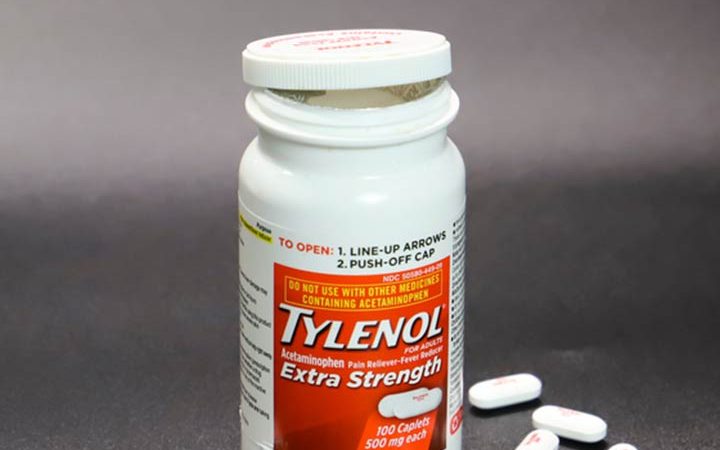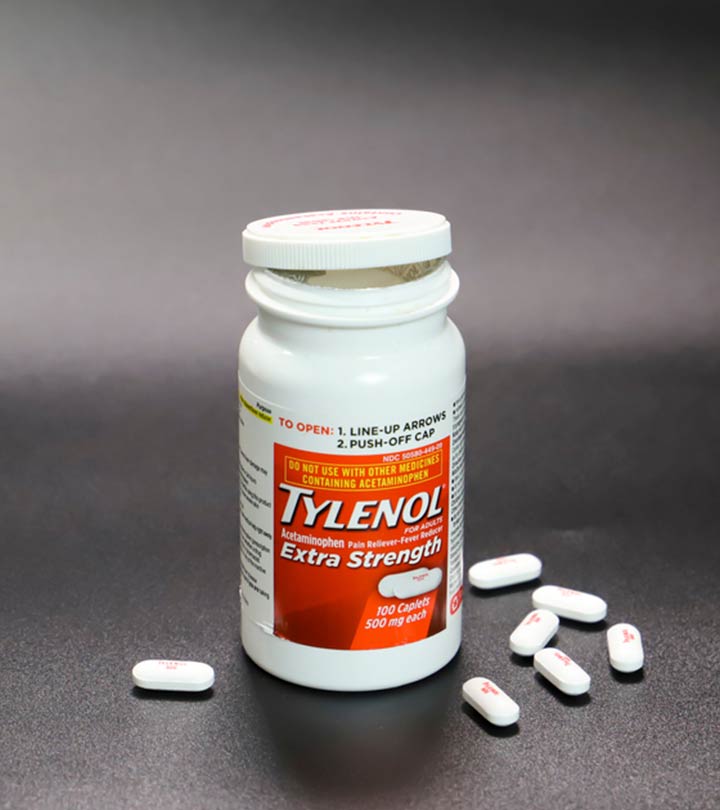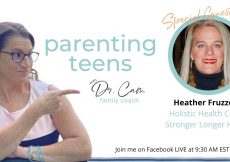Tylenol is the brand name for Acetaminophen (generic), commonly used to ease pain and fever. The over-the-counter medicine (OTC) is available in pharmacies without a doctor’s prescription. It is a safe medication for children if taken as directed, but too much of it can be harmful and may cause liver damage. Acetaminophen may be available in combination with other drugs, so you must check the label carefully before giving the medicine to your child (1).
This post gives you important information about the safe use of children’s Tylenol, its dosage, side effects, and precautions.
Can Tylenol Be Given To Children?
Yes, Tylenol is available in variants meant for infants and children. Children’s Tylenol is the brand name of the variant meant for children aged two years and older. It is still recommended to consult a doctor before giving Tylenol to your child, especially if they are less than four years old (2).
How Does Tylenol Work?
All products of the brand Tylenol contain Acetaminophen as the primary active ingredient. Acetaminophen works by reducing some of the body’s natural substances known as prostaglandins in the central nervous system. It ultimately works as an analgesic (painkiller) and antipyretic (fever reducer) product, relieving the following conditions in children (1) (3).
- Aches, pain, sore throat, and fever due to a cold or the flu
- Headache and toothache
A few Children’s Tylenol sub-variants indicated for cough, cold, runny nose, and sore throat also contain drugs such as Dextromethorphan, Chlorpheniramine, and Phenylephrine.
- Dextromethorphan is an antitussive that works by decreasing activity in the part of the brain that causes coughing (4).
- Chlorpheniramine is an antihistamine drug used to relieve symptoms of allergies (5).
- Phenylephrine constricts nasal blood vessels and acts as a nasal decongestant to relieve a stuffy nose (6).
The following table summarizes the ingredients of different Children’s Tylenol products/sub-variants (7).
|
Product name |
Acetaminophen |
Dextromethorphan |
Chlorpheniramine |
Phenylephrine |
|
Children’s Tylenol liquid Pain + Fever |
160mg per 5ml |
|||
|
Children’s Tylenol chewables Pain + Fever |
160mg per tablet |
|||
|
Children’s Tylenol liquid Cold + Cough + Runny Nose |
160mg per 5ml |
5mg per 5ml |
1mg per 5ml |
|
|
Children’s Tylenol liquid Cold + Cough + Sore Throat |
160mg per 5ml |
5mg per 5ml |
||
|
Children’s Tylenol liquid Cold + Flu |
160mg per 5ml |
5mg per 5ml |
1mg per 5ml |
2.5mg per 5ml |
|
Children’s Tylenol Dissolve Powder |
160mg per packet |
What Is The Dosage Of Tylenol For Children?
Children’s Tylenol or Acetaminophen for fever and pain is available as a chewable tablet, liquid (oral suspension), and powder. The precise dosage depends on the age and body weight of your child. One dose may be given every four to six hours, but no more than four doses should be given within 24 hours (8).
|
Weight |
24 to 35 lb (11 to 15 kg) |
36 to 47 lb (16 to 21 kg) |
48 to 59 lb (22 to 26 kg) |
60 to 71 lb (27 to 32 kg) |
72 to 95 lb (33 to 43 kg) |
96 lb or more (44 kg or more) |
|
Age |
2 to 3 years |
4 to 5 years |
6 to 8 years |
9 to 10 years |
11 years |
12 years and older |
|
Children’s Acetaminophen liquid (160mg/5mL) |
5mL |
7.5mL |
10mL |
12.5mL |
15mL |
20 mL |
|
Children’s Acetaminophen chewables (160mg) |
1 tablet |
1 ½ tablets |
2 tablets |
2 ½ tablets |
3 tablets |
4 tablets |
|
Children’s Acetaminophen dissolvable packet (160mg/powder packet) |
– |
– |
2 packets |
2 packets |
3 packets |
– |
|
Adult’s Acetaminophen tablets (325mg) |
– |
– |
1 tablet |
1 tablet |
1 ½ tablets |
2 tablets |
|
Adult’s Acetaminophen tablets (500mg) |
– |
– |
– |
– |
1 tablet |
1 tablet |
Source: American Academy of Pediatrics
Below is the dosage of Tylenol combination products (medicines with more than one ingredient) according to the brand’s product labeling (7).
|
Body weight |
Under 36 pounds |
36-47 pounds |
48-95 pounds |
|
Age |
Below 4 years |
4 to 5 years |
6 to 11 years |
|
Children’s Tylenol liquid Cold + Cough + Runny Nose |
Do not use |
Do not use unless directed by a doctor |
10ml |
|
Children’s Tylenol liquid Cold + Cough + Sore Throat |
Do not use |
5 ml |
10ml |
|
Children’s Tylenol liquid Cold + Flu |
Do not use |
Do not use unless directed by a doctor |
10ml |
What Are The Side Effects Of Tylenol In Children?
Acetaminophen may cause the following common side effects in children (9).
- Upset stomach
- Nausea and vomiting
- Trouble sleeping
- Headache
- Constipation
Rare adverse effects may include the following (10).
- Signs of liver problems such as loss of appetite, stomach pain (upper right side), tiredness, itching, dark urine, clay-colored stools, and jaundice (yellowing of the skin or eyes).
- Skin redness or a rash that spreads and causes blistering and peeling.
- Signs of allergic or hypersensitivity reactions such as itching, hives, difficulty breathing, and swelling of the face, lips, tongue, or throat.
Stop giving the medication to your child and seek immediate medical attention if your child experiences any of the adverse side effects.
Are There Any Overdose Warnings For Tylenol?
Tylenol provides a warning against liver problems in the product label. Severe liver damage may occur if your child takes (11):
- More than five doses in 24 hours
- Has Tylenol with other Acetaminophen-containing drugs, leading to accidental overdose
In case of overdose, get medical help or contact a poison control center immediately.
What Precautions Should You Take When Using Tylenol In Children?
Observe the following precautions for the safe use of Tylenol among children (12).
- Carefully read the product labels for the list of ingredients and dosage. Preferably use products meant for children and those having a single ingredient (Acetaminophen).
- Use the dosing device provided with the pack to correctly dispense a dose. Avoid using kitchen spoons and cups as they may vary in size.
- Shake the bottle well before measuring when using the liquid form or oral suspension.
- Many OTC medications contain Acetaminophen. Do not give your child Tylenol if he/she is already taking such a product.
- Do not use Tylenol for more than two days without consulting your child’s healthcare provider.
- Tylenol products with multiple ingredients may cause drowsiness in children. See that your child avoids activities requiring alertness, such as riding a bicycle, skateboarding, or dealing with sharp objects.
- If your child misses a dose and the time for the next dose is near, do not give double doses.
- Keep all medications out of children’s reach to avoid accidental overdose.
- Discuss with your child’s healthcare provider if you decide to give your child any dietary supplements or herbal products while they are on Tylenol. It could help avoid any interaction between Tylenol and the supplement.
Tylenol is safe and effective if given in the correct dosage to children. It is advisable to consult a doctor before giving the medication to children, especially when the product contains additional drugs with Acetaminophen. Look out for signs and symptoms of adverse reactions and report them to your child’s healthcare provider to avoid any complications.
References:
MomJunction’s articles are written after analyzing the research works of expert authors and institutions. Our references consist of resources established by authorities in their respective fields. You can learn more about the authenticity of the information we present in our editorial policy.
The following two tabs change content below.




































